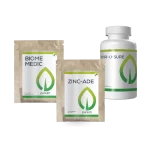Vitamin C is a critical nutrient for good health! Let’s break down why this vitamin is so important in a simple and easy-to-understand way.
What is Vitamin C? Vitamin C, also known as ascorbic acid, is a water-soluble vitamin found in various fruits and vegetables. It’s not something our bodies can produce, so we need to get it from our diet.
Why Is Vitamin C Important?
- Immune System Support: One of the most well-known roles of vitamin C is its support for the immune system. It helps our bodies fight off infections and stay healthy.
- Collagen Production: Vitamin C plays a crucial role in making collagen, a protein that helps with skin elasticity, wound healing, and keeping our joints and blood vessels strong.
- Antioxidant Power: Vitamin C is a potent antioxidant, which means it helps protect our cells from damage caused by harmful molecules called free radicals. This can help prevent chronic diseases.
- Iron Absorption: It also enhances the absorption of iron from plant-based sources, making it important for people who follow vegetarian or vegan diets.
Sources of Vitamin C: You can find vitamin C in a variety of foods, including:
- Citrus fruits like oranges, lemons, and grapefruits.
- Berries such as strawberries and blueberries.
- Kiwi.
- Bell peppers.
- Broccoli.
- Spinach.
How Much Do You Need? The recommended daily amount of vitamin C for adults is around 65-90 milligrams (mg). However, some experts suggest that higher doses may be beneficial, especially during times of illness or stress.
Can You Get Too Much Vitamin C? Vitamin C is generally safe, but extremely high doses can cause stomach upset or diarrhea. It’s best to get your vitamin C from a balanced diet.
Purium and Vitamin C: Purium offers products that can complement your vitamin C intake, such as whole food supplements containing fruits and vegetables rich in this vital nutrient. Always consult with a healthcare professional before adding supplements to your diet.
Purium Products that Contain Vitamin C:
Vitamin C is indeed critical for good health. It supports our immune system, aids in collagen production, acts as an antioxidant, and helps with iron absorption. Make sure to include vitamin C-rich foods in your diet to stay healthy and vibrant.
Health Benefits Of Vitamin C
Vitamin C isn’t just your average vitamin – it’s a superstar nutrient with a wide range of health benefits. Let’s dive into the fantastic world of vitamin C and explore how it can boost your well-being:
- Immune System Support: Vitamin C is like a shield for your immune system. It helps your body fend off infections, colds, and other illnesses by supporting the production and function of white blood cells, which are your immune system’s soldiers.
- Powerful Antioxidant: Think of vitamin C as your body’s cleanup crew. It sweeps away harmful free radicals, which are unstable molecules that can damage your cells and DNA. This antioxidant power can help reduce the risk of chronic diseases and slow down the aging process.
- Collagen Production: Vitamin C is like the builder of your body’s structural framework. It’s essential for producing collagen, a protein that gives structure to your skin, bones, tendons, and blood vessels. This means healthier skin, faster wound healing, and stronger joints.
- Skin Health: Want radiant skin? Vitamin C can help. It fights skin aging by reducing the appearance of wrinkles and age spots. It can also protect your skin from the sun’s harmful UV rays (although it’s not a substitute for sunscreen!).
- Heart Health: Vitamin C may have a positive impact on heart health by improving blood vessel function, reducing blood pressure, and lowering the risk of heart disease.
- Iron Absorption: If you get your iron from plant-based sources like beans and spinach, vitamin C can enhance iron absorption, helping to prevent iron-deficiency anemia.
- Brain Health: Some studies suggest that vitamin C may protect against cognitive decline as you age, potentially reducing the risk of conditions like Alzheimer’s disease.
- Stress Buster: When you’re stressed, your body’s vitamin C levels can drop. Supplementing with vitamin C during stressful times may help your body cope better with the pressure.
- Allergy Relief: If you suffer from allergies, vitamin C may help alleviate symptoms by reducing histamine levels in the body.
- Immune Challenges: In some cases, taking high doses of vitamin C (under medical supervision) can assist in managing certain health challenges, though it’s not a cure-all.
Getting Your Vitamin C: The best way to reap these benefits is through a balanced diet. Load up on vitamin C-rich foods like citrus fruits (oranges, lemons, grapefruits), berries, kiwi, bell peppers, broccoli, and spinach.
Supplements and Purium: If you have trouble getting enough vitamin C from your diet or during specific health situations, supplements can be an option. Purium offers whole food supplements that contain natural sources of vitamin C, providing a convenient way to ensure you meet your daily needs.
Remember, while vitamin C is fantastic for your health, it’s not a magic cure-all. It’s most effective when part of a well-rounded diet and a healthy lifestyle.
Vitamin C Deficiency
Vitamin C deficiency, also known as scurvy, is a condition that occurs when your body doesn’t get enough vitamin C. Let’s break down what vitamin C deficiency is, its causes, symptoms, and how to prevent it.
Causes of Vitamin C Deficiency:
- Dietary Insufficiency: The most common cause of vitamin C deficiency is not getting enough of this vitamin through your diet. If you don’t regularly consume vitamin C-rich foods, you are at risk. This can happen in individuals with limited access to fresh fruits and vegetables.
- Poor Food Choices: A diet heavily reliant on processed and fast foods that lack fresh fruits and vegetables can lead to vitamin C deficiency.
- Cooking and Food Storage: Overcooking or long-term storage of fruits and vegetables can destroy vitamin C, reducing its availability in your diet.
- Certain Medical Conditions: Some medical conditions, such as digestive disorders that affect nutrient absorption (e.g., Crohn’s disease), can interfere with the body’s ability to absorb vitamin C.
- Alcohol and Smoking: Excessive alcohol consumption and smoking can deplete vitamin C levels in the body.
Symptoms of Vitamin C Deficiency: Vitamin C deficiency can lead to a range of symptoms, including:
- Fatigue and weakness.
- Muscle and joint pain.
- Swollen and bleeding gums.
- Easy bruising.
- Dry, scaly skin.
- Slow wound healing.
- Anemia (low red blood cell count).
- Weakened immune system, making you more susceptible to infections.
- Mood changes and irritability.
Preventing Vitamin C Deficiency:
- Dietary Changes: The most effective way to prevent vitamin C deficiency is to incorporate vitamin C-rich foods into your diet regularly. Citrus fruits (oranges, lemons, grapefruits), berries, kiwi, bell peppers, broccoli, and spinach are excellent sources.
- Limit Smoking and Alcohol: If you smoke, consider quitting, and limit alcohol consumption.
- Avoid Overcooking: Cook fruits and vegetables gently to preserve their vitamin C content.
- Supplements: In cases of severe deficiency or when dietary changes are challenging, vitamin C supplements may be recommended by a healthcare professional.
- Medical Evaluation: If you suspect you have vitamin C deficiency or are at risk due to a medical condition, consult a healthcare provider for evaluation and guidance.
Vitamin C deficiency is rare in developed countries where a variety of foods are readily available. However, it can still occur in certain situations. Being aware of the importance of vitamin C and maintaining a balanced diet can help ensure you get enough of this essential nutrient for overall health and well-being. If you suspect you have symptoms of vitamin C deficiency, seek medical advice promptly to address the issue and prevent further health complications.
How does Vitamin C protect you from viruses?
Vitamin C plays a vital role in supporting the immune system, and while it doesn’t provide direct protection from viruses, it can enhance your body’s ability to defend itself against them. Here’s how vitamin C contributes to immune health and its role in virus protection:
- Immune System Support:
- White Blood Cell Function: Vitamin C is essential for the production and function of white blood cells, such as lymphocytes and phagocytes. These cells are the foot soldiers of your immune system and are responsible for detecting and fighting off viruses and other pathogens.
- Enhanced Immune Response: Adequate vitamin C levels help your immune system respond more effectively to infections. It can enhance the body’s ability to recognize and attack viruses when they enter the body.
- Antioxidant Properties:
- Vitamin C is a powerful antioxidant, which means it helps neutralize harmful molecules called free radicals in your body. These free radicals can damage cells, including those in the immune system. By reducing this damage, vitamin C helps your immune cells function optimally.
- Reduction in Inflammation:
- Vitamin C may help reduce inflammation in the body. Excessive inflammation can weaken the immune system and make you more susceptible to infections. By mitigating inflammation, vitamin C indirectly supports immune health.
- Improved Barrier Function:
- Vitamin C is involved in the production of collagen, a protein that plays a crucial role in maintaining the integrity of your skin and mucous membranes. A strong barrier can prevent viruses from entering the body through the respiratory and digestive tracts.
- Faster Recovery:
- When you’re sick with a viral infection, your body’s demand for vitamin C increases. Adequate vitamin C intake during illness may help reduce the duration and severity of symptoms, facilitating a quicker recovery.
Important Considerations:
- While vitamin C can support immune health, it’s not a standalone solution for preventing or treating viral infections. It should be part of a broader strategy that includes practices like good hygiene (handwashing), vaccination (when available), and a balanced diet.
- Getting vitamin C from a variety of food sources is ideal because it provides other essential nutrients that work together to support immune function.
- High doses of vitamin C supplements may not provide additional benefits for the immune system, and excessive intake can lead to digestive issues. It’s best to meet your vitamin C needs through a well-balanced diet.
In summary, vitamin C is an essential nutrient that supports your immune system in its battle against viruses and other pathogens. It helps boost immune function, reduces oxidative stress, and promotes overall health, all of which contribute to your body’s ability to protect itself from viral infections. However, it’s crucial to maintain a well-rounded approach to health, including other preventive measures, for comprehensive virus protection.
Vitamin C can help boost your immune system! Vitamin C must be obtained from supplements or foods. #HealthSurgeon
Read More: Can You Take Vitamin C And Zinc Together?
Sources:
https://wellself.com/hand-washing-health-benefits/
https://www.mayoclinic.org/drugs-supplements-vitamin-c/art-20363932#:~:text=Vitamin%20C%20is%20an%20antioxidant,disease%2C%20cancer%20and%20other%20diseases.
https://ods.od.nih.gov/factsheets/VitaminC-HealthProfessional/
https://www.nhs.uk/conditions/vitamins-and-minerals/vitamin-c/









